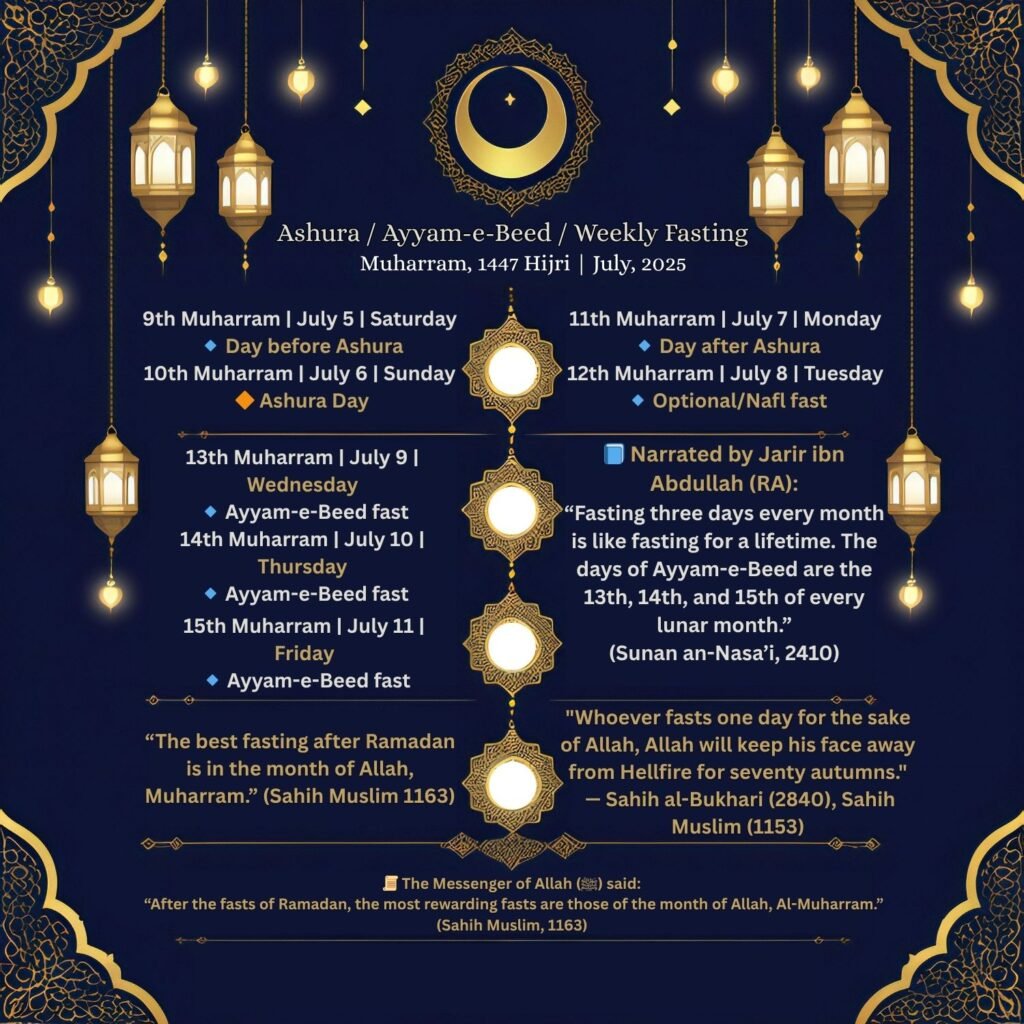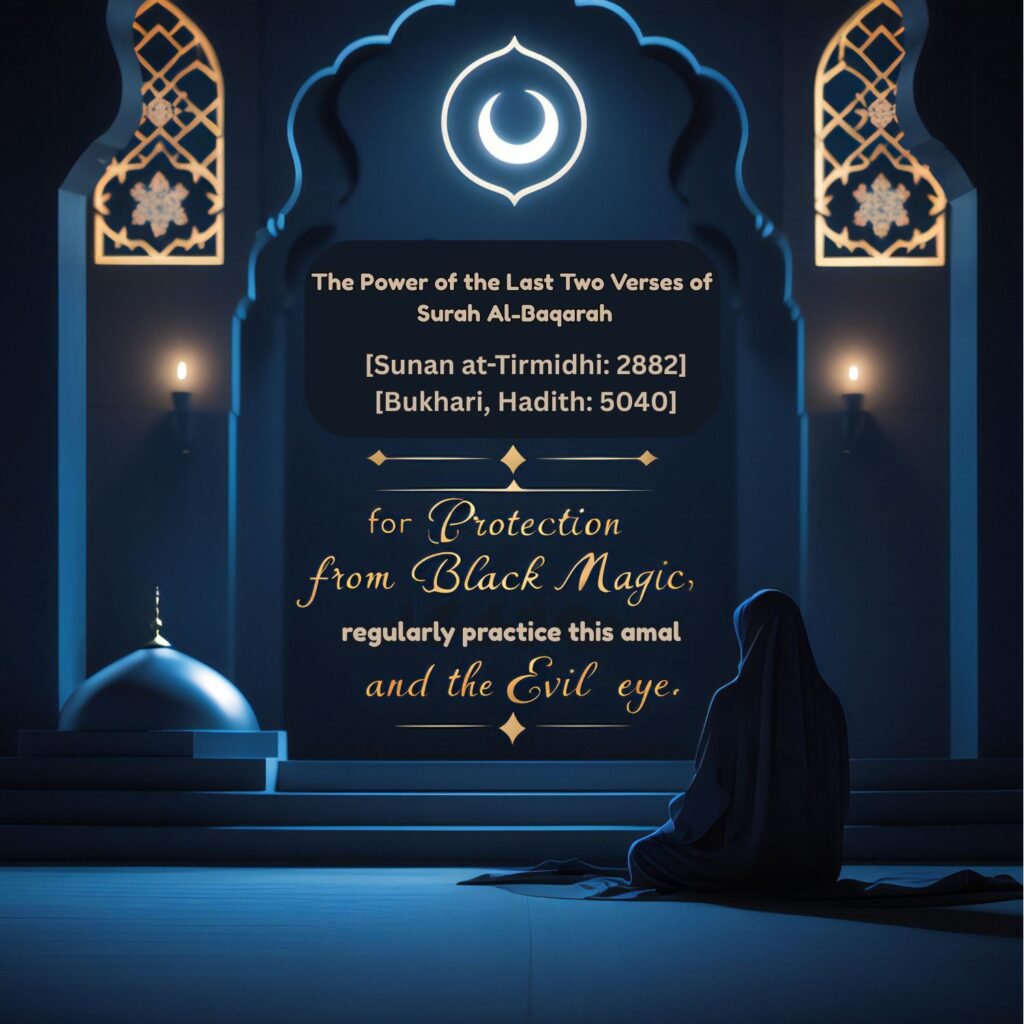Dua at the Beginning of Salah #1
Narrated by Abu Huraira (RA):
The Messenger of Allah (ﷺ) used to remain silent for a short while between the Takbir (Takbir-e-Tahrimah) and the recitation (Qur’an) during Salah. I asked, “O Messenger of Allah! May my parents be sacrificed for you, what do you say during the pause between Takbir and recitation?”
He (ﷺ) replied:
“Allahumma baa‘id baynee wa bayna khataayaaya kama baa‘adta baynal mashriqi wal maghrib. Allahumma naqqinee min khataayaaya kamaa yunaqqath-thawbul abyadhu minad-danas. Allahum-maghsilnee min khataayaaya bil-maa’i wath-thalji wal-barad.”
اَللّٰهُمَّ بَاعِدْ بَيْنِيْ وَبَيْنَ خَطَايَايَ كَمَا بَاعَدْتَ بَيْنَ الْمَشْرِقِ وَالْمَغْرِبِ، اَللّٰهُمَّ نَقِّنِيْ مِنْ خَطَايَايَ كَمَا يُنَقَّى الثَّوْبُ الْاَبْيَضُ مِنَ الدَّنَسِ، اَللّٰهُمَّ اغْسِلْنِيْ مِنْ خَطَايَايَ بِالْمَاءِ وَالثَّلْجِ وَالْبَرَدِ
Translation:
“O Allah! Separate me from my sins as You have separated the East and the West. O Allah! Cleanse me of my sins as a white garment is cleansed of dirt. O Allah! Wash away my sins with water, snow, and hail.”
Sources:
Sahih al-Bukhari 1/181, Hadith No. 744
Sahih Muslim 1/419, Hadith No. 598
Hisnul Muslim (Fortress of the Muslim)
Dua at the Beginning of Salah #2
“Subhanak-Allahumma wa bihamdika, wa tabaarakas-muka, wa ta‘aalaa jadduka, wa laa ilaaha ghayruk.”
سُبْحَانَكَ اللّٰهُمَّ وَبِحَمْدِكَ، وَتَبَارَكَ اسْمُكَ، وَتَعَالٰى جَدُّكَ، وَلَآ اِلٰهَ غَيْرُكَ
Translation:
“Glory is to You, O Allah, and praise is to You. Blessed is Your Name, Exalted is Your Majesty, and there is no god besides You.”
Transliteration:
Subhaanaka-Allahumma wa bihamdika, wa tabaarakas-muka, wa ta‘aalaa jadduka, wa laa ilaaha ghayruk.
Sources:
Sahih Muslim, Hadith No. 399
Abu Dawood, No. 775
Tirmidhi, No. 243
Ibn Majah, No. 806
An-Nasa’i, No. 899
Also referenced in: Sahih Tirmidhi 1/77, Sahih Ibn Majah 1/135
Dua at the Beginning of Salah #3
Arabic:
وَجَّهْتُ وَجْهِيَ لِلَّذِيْ فَطَرَ السَّمَاوَاتِ وَالْاَرْضَ حَنِيْفًا وَّمَآ اَنَا مِنَ الْمُشْرِكِيْنَ،
اِنَّ صَلَاتِيْ، وَنُسُكِيْ، وَمَحْيَايَ، وَمَمَاتِيْ لِلّٰهِ رَبِّ الْعَالَمِيْنَ،
لَا شَرِيْكَ لَهٗ وَبِذٰلِكَ اُمِرْتُ وَاَنَا مِنَ الْمُسْلِمِيْنَ
Translation:
“I have turned my face sincerely towards Him Who created the heavens and the earth, and I am not among the polytheists. Indeed, my prayer, my sacrifice, my living and my dying are for Allah, the Lord of all the worlds. He has no partner. This is what I have been commanded, and I am among the Muslims.”
Transliteration:
Wajjahtu wajhiya lilladhī faṭaras-samāwāti wal-arḍa ḥanīfan wa mā ana minal-mushrikīn.
Inna ṣalātī wa nusukī wa maḥyāya wa mamātī lillāhi rabbil-‘ālamīn.
Lā sharīka lahu wa bidhālika umirtu wa anā minal-muslimīn.
Sahih Muslim, Hadith 771
(Book: 6 – The Traveler’s Prayer and the Shortening of It, Chapter 26 – The Night Prayer Duʿā)
Continuation of Night Prayer Duʿā:
Arabic:
اَللّٰهُمَّ اَنْتَ الْمَلِكُ لَآ اِلَهَ اِلَّآ اَنْتَ، اَنْتَ رَبِّيْ وَاَنَا عَبْدُكَ، ظَلَمْتُ نَفْسِيْ، وَاعْتَرَفْتُ بِذَنْبِيْ، فَاغْفِرْ لِيْ ذُنُوْبِيْ جَمِيْعًا، اِنَّهُ لَا يَغْفِرُ الذُّنُوْبَ اِلَّآ اَنْتَ، وَاهْدِنِيْ لِاَحْسَنِ الْاَخْلَاقِ لَا يَهْدِيْ لِاَحْسَنِهَآ اِلَّآ اَنْتَ وَاصْرِفْ عَنِّيْ سَيِّئَهَا لَا يَصْرِفُ عَنِّيْ سَيِّئَهَا اِلَّآ اَنْتَ
Translation:
“O Allah, You are the King, there is no deity but You. You are my Lord and I am Your servant. I have wronged myself and admit my sins, so forgive all of my sins, for no one forgives sins except You. Guide me to the best of character, for none guides to it but You. And turn me away from bad character, for none can turn it away but You.”
Transliteration :
Allāhumma anta al-malik, lā ilāha illā anta, anta rabbī wa ana ‘abduka…
Sahih Muslim 1/534, Hadith 771
(Hisnul Muslim reference included)
Short Invocation of Humility:
Translation:
“Here I am, O Allah, ready and always at Your service. All good is in Your Hands, and evil is not attributable to You. I am by You and unto You. Blessed are You and Exalted. I seek Your forgiveness and turn to You in repentance.”
Transliteration:
Labbayka wa sa‘dayka, wal-khayru kulluhu fī yadayka, wash-sharru laisa ilayka.
Anā bika wa ilayka, tabārakta wa ta‘ālayta, astaghfiruka wa atūbu ilayk.
Sahih Muslim 1/534, Hadith 771
Dua at the Beginning of Salah #4
Arabic:
اَللّٰهُمَّ رَبَّ جِبْرَاۤئِيْلَ، وَمِيْكَاۤئِيْلَ، وَاِسْرَافِيْلَ، فَاطِرَ السَّمَاوَاتِ وَالْاَرْضِ، عَالِمَ الْغَيْبِ وَالشَّهَادَةِ اَنْتَ تَحْكُمُ بَيْنَ عِبَادِكَ فِيْمَا كَانُوْا فِيْهِ يَخْتَلِفُوْنَ، اِهْدِنِيْ لِمَا اخْتُلِفَ فِيْهِ مِنَ الْحَقِّ بِاِذْنِكَ اِنَّكَ تَهْدِيْ مَنْ تَشَاۤءُ اِلٰى صِرَاطٍ مُسْتَقِيْمٍ
Translation:
“O Allah! Lord of Jibreel, Mikaeel, and Israfeel – Creator of the heavens and the earth, Knower of the unseen and the seen. You will judge between Your servants concerning that in which they differ. Guide me, by Your permission, to the truth in that wherein they differ. Verily, You guide whom You will to the straight path.”
Transliteration:
*Allāhumma rabbā Jibrā’īl, wa Mīkā’īl, wa Isrāfīl, fāṭiras-samāwāti wal-arḍ,
‘Ālimal-ghaybi wash-shahādah, anta taḥkumu bayna ‘ibādika fīmā kānū fīhi yakhtalifūn,
Ihdinī limakhtulifa fīhi minal-ḥaqqi bi
Salah Opening Dua #5
Arabic (repeated 3x):
اَللّٰهُ اَكْبَرُ كَبِيْرًا، اَللّٰهُ اَكْبَرُ كَبِيْرًا، اَللّٰهُ اَكْبَرُ كَبِيْرًا، وَالْحَمْدُ لِلّٰهِ كَثِيْرًا، وَالْحَمْدُ لِلّٰهِ كَثِيْرًا، وَالْحَمْدُ لِلّٰهِ كَثِيْرًا، وَسُبْحَانَ اللّٰهِ بُكْرَةً وَّاَصِيْلًا
Translation:
“Allah is the Greatest, exceedingly Great (x3). And all praise is due to Allah in abundance (x3). Glory be to Allah in the morning and in the evening.”
Then say:
اَعُوْذُ بِاللّٰهِ مِنَ الشَّيْطَانِ مِنْ نَفْخِهٖ، وَنَفْثِهٖ، وَهَمْزِهٖ .
Translation:
“I seek refuge in Allah from Satan—his arrogance (blowing), his poetry (spitting), and his madness (touch).”
References:
Abu Dawood 1/203, Hadith 764
Ibn Majah 1/265, Hadith 807
Ahmad 4/85, Hadith 16739
Classed as Hasan li-ghayrihi (authentic through supporting narrations)
Du’a at the Beginning of Salah #6
The Messenger of Allah (peace and blessings be upon him) used to recite this du’a when he woke up at night to perform the Tahajjud prayer.
Arabic:
اَللّٰهُمَّ لَكَ الْحَمْدُ، اَنْتَ نُوْرُ السَّمَاوَاتِ وَالْاَرْضِ وَمَنْ فِيْهِنَّ، وَلَكَ الْحَمْدُ اَنْتَ قَيِّمُ السَّمَاوَاتِ وَالْاَرْضِ وَمَنْ فِيْهِنَّ، وَلَكَ الْحَمْدُ اَنْتَ رَبُّ السَّمَاوَاتِ وَالْاَرْضِ وَمَنْ فِيْهِنَّ وَلَكَ الْحَمْدُ لَكَ مُلْكُ السَّمَاوَاتِ وَالْاَرْضِ وَمَنْ فِيْهِنَّ وَلَكَ الْحَمْدُ اَنْتَ مَلِكُ السَّمَاوَاتِ وَالْاَرْضِ
Translation:
O Allah! All praise is due to You; You are the Light of the heavens and the earth and whatever is in them. All praise is due to You; You are the Sustainer of the heavens and the earth and whatever is in them. All praise is due to You; You are the Lord of the heavens and the earth and whatever is in them. All praise is due to You; to You belongs the dominion of the heavens and the earth and whatever is in them. All praise is due to You; You are the King of the heavens and the earth.
Transliteration:
Allahumma lakal-hamdu anta noorus-samawati wal-ardi wa man feehinna, wa lakal-hamdu anta qayyimus-samawati wal-ardi wa man feehinna, wa lakal-hamdu anta rabbus-samawati wal-ardi wa man feehinna, wa lakal-hamdu, laka mulkus-samawati wal-ardi wa man feehinna, wa lakal-hamdu, anta malikus-samawati wal-ard.
Arabic:
وَلَكَ الْحَمْدُ، اَنْتَ الْحَقُّ، وَوَعْدُكَ الْحَقُّ، وَقَوْلُكَ الْحَقُّ، وَلِقَاؤُكَ الْحَقُّ، وَالْجَنَّةُ حَقٌّ، وَالنَّارُ حَقٌّ، وَالنَّبِيُّوْنَ حَقٌّ، وَمُحَمَّدٌ حَقٌّ، وَالسَّاعَةُ حَقٌّ
Translation:
All praise is due to You; You are the Truth, Your promise is the truth, Your word is the truth, meeting You is the truth, Paradise is the truth, Hellfire is the truth, the Prophets are the truth, Muhammad (peace and blessings be upon him) is the truth, and the Hour (Day of Judgment) is the truth.
Transliteration:
Wa lakal-hamdu, antal-haqqu, wa wa‘dukal-haqqu, wa qawluka al-haqqu, wa liqā’uka al-haqqu, wal-jannatu haqqun, wan-nāru haqqun, wan-nabiyyūna haqqun, wa Muḥammadun haqqun, was-sā‘atu haqqun.
Arabic:
اَللّٰهُمَّ لَكَ اَسْلَمْتُ، وَعَلَيْكَ تَوَكَّلْتُ، وَبِكَ اٰمَنْتُ، وَاِلَيْكَ اَنَبْتُ، وَبِكَ خَاصَمْتُ، وَاِلَيْكَ حَاكَمْتُ، فَاغْفِرْ لِيْ مَا قَدَّمْتُ، وَمَا اَخَّرْتُ، وَمَا اَسْرَرْتُ، وَمَا اَعْلَنْتُ
Translation:
O Allah! I have submitted to You, relied upon You, believed in You, turned to You, argued for Your sake, and referred judgment to You. So forgive me for what I have done before and after, what I have kept hidden and what I have made public.
Transliteration:
Allahumma laka aslamtu, wa ‘alayka tawakkaltu, wa bika āmantu, wa ilayka anabtu, wa bika khāsamtu, wa ilayka ḥākamtu, faghfir lī mā qaddamtu, wa mā akhkhartu, wa mā asrartu, wa mā a‘lamtu.
Arabic:
اَنْتَ الْمُقَدِّمُ، وَاَنْتَ الْمُؤَخِّرُ لَآ اِلٰهَ اِلَّا اَنْتَ
Translation:
You are the One Who brings forward, and You are the One Who delays. There is no deity worthy of worship except You.
Transliteration:
Antal-muqaddimu, wa antal-mu’akhkhiru, lā ilāha illā anta.
Arabic:
اَنْتَ اِلٰهِيْ لَآ اِلٰهَ اِلَّا اَنْتَ
Translation:
You are my God. There is no deity worthy of worship except You.
Transliteration:
Anta ilāhī, lā ilāha illā anta.
Sources:
Bukhari (with Fath al-Bari) 3/3, 11/116, 13/371, 423, 465; Hadith No. 1120, 6317, 7385, 7442, 7499;
Muslim (abridged) 1/532, Hadith No. 769.
Salah Opening Dua #7
We have seen that the Qur’an is the greatest dhikr (remembrance) of Allah. In standing during salah, recitation of the Qur’an is the main dhikr. Moreover, in the Tahajjud prayer, it is narrated in various hadiths that the Messenger of Allah (ﷺ) used to make du‘a between recitations. We have seen that Imam Abu Hanifa also permitted such du‘a in fard and congregational prayers for both the imam and followers, provided that such supplication is not done aloud, and that remaining engaged in reciting or listening to the Qur’an—the best form of dhikr—is considered more virtuous. However, in Tahajjud or individual prayers, making du‘a between recitation is an important Sunnah and greatly helpful for increasing khushu‘ (humility) in salah. The Prophet (ﷺ) used to supplicate based on the meaning of the verses recited. Here is one such du‘a:
اللّٰهُمَّ اِنِّيْٓ اَسْاَلُكَ اِيْمَانًا لَّا يَرْتَدُّ، وَنَعِيْمًا لَّا يَنْفَدُ، وَمُرَافَقَةَ مُحَمَّدٍ صَلَّى اللّٰهُ عَلَيْهِ وَسَلَّمَ فِيْٓ اَعْلٰى جَنَّةِ الْخُلْدِ
Translation:
“O Allah, I ask You for unwavering faith that does not recede, a blessing that never ends, and the companionship of Muhammad (ﷺ) in the highest part of Jannat al-Khuld (Eternal Paradise).”
Transliteration:
Allahumma inni as’aluka imanan la yartaddu, wa na‘iman la yanfadu, wa murafaqata Muhammadin sallallahu ‘alayhi wa sallama fi a‘la jannatil-khuld.
Abdullah ibn Mas‘ud (RA) said: He was praying in the mosque (Tahajjud). At that time, the Messenger of Allah (ﷺ) entered the mosque with Abu Bakr (RA) and ‘Umar (RA). Abdullah ibn Mas‘ud (RA) was reciting Surah An-Nisa. When he reached verse 100, he began making du‘a while standing in prayer. At that time, the Messenger of Allah (ﷺ) said three times: “Ask, and your du‘a will be accepted.” Then Abdullah ibn Mas‘ud (RA) made this supplication. This hadith is Hasan (sound).
It is recommended to recite this du‘a during the recitation in Tahajjud, within salah, before or after the taslim (ending the prayer), and at any time.
References:
[1] Musnad Ahmad 1/454; Ibn Hibban, Sahih 5/303; Al-Albani, Silsilah As-Sahihah 5/379; Rahe Belayet – Dhikr No. 50
Collected








